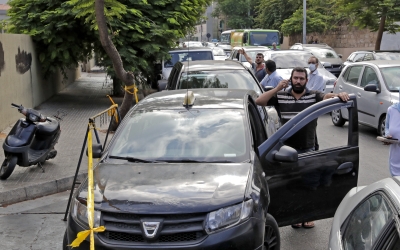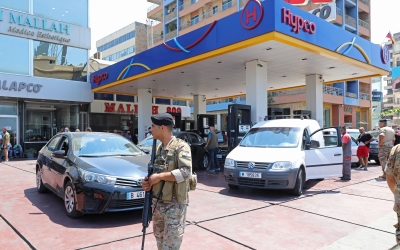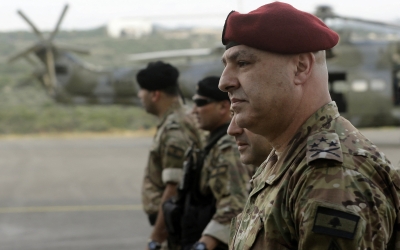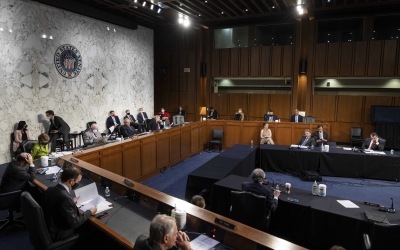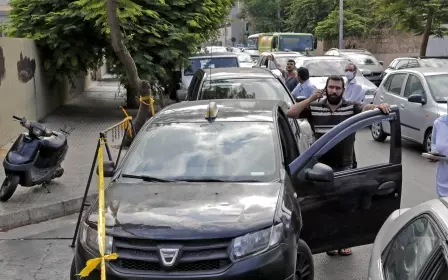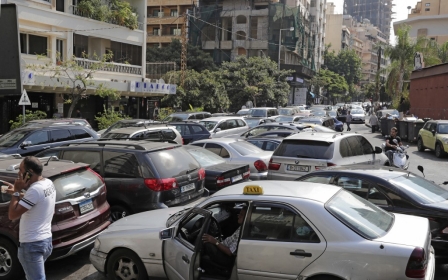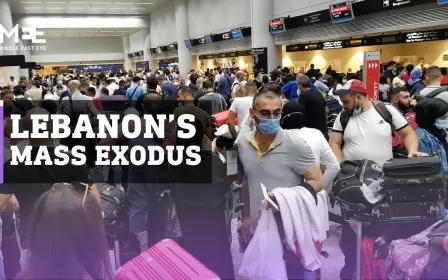Iranian fuel shipments to Lebanon pose new challenge for Biden, experts say
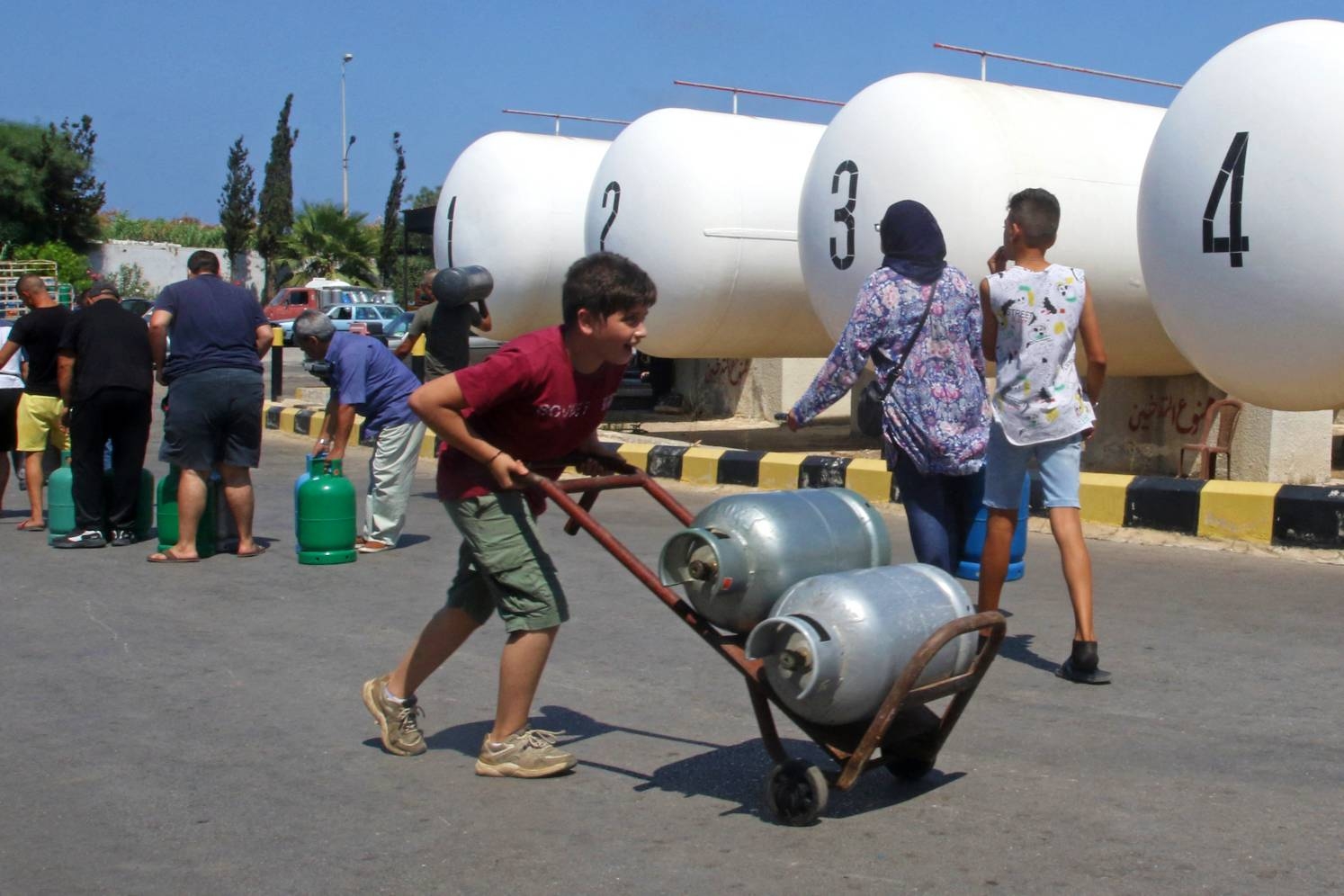
Hezbollah's decision to arrange multiple deliveries of Iranian fuel to Lebanon poses a series of challenges for the US as it prepares to craft a response to the country's crippling energy crisis, experts have said.
In a speech on Friday, Hezbollah leader Hassan Nasrallah blamed the US for Lebanon's economic woes and said Caesar sanctions imposed by Washington on Syria had harmed Lebanon.
"Go ahead and give Lebanon an exemption for Iranian gasoline and diesel… go ahead and give Lebanon an exemption from Caesar," Nasrallah said, addressing the US in his speech.
Earlier this month, when Nasrallah announced that the first vessel loaded with Iranian fuel had set sail from the Islamic Republic, the US ambassador to Lebanon informed President Michel Aoun that Washington was negotiating with the World Bank, Jordan and Egypt to find a solution to the country's energy crisis.
The plan would see Egyptian natural gas transported to Lebanon via the Arab Gas pipeline, which crosses through Jordan and Syria. Jordan would also be allowed to sell electricity to Lebanon by transporting power through Syria via the Arab interconnection grid.
New MEE newsletter: Jerusalem Dispatch
Sign up to get the latest insights and analysis on Israel-Palestine, alongside Turkey Unpacked and other MEE newsletters
Both routes require rehabilitating infrastructure to meet the demands of increased capacity, and green-lighting a certain level of cooperation between US regional allies and the goverment of President Bashar al-Assad in Syria.
A State Department spokesperson told Middle East Eye they would not comment on the specifics of any ongoing diplomatic talks, but said Washington "supports efforts to find creative, transparent, and sustainable energy solutions that will address Lebanon’s acute energy and fuel shortages".
Hezbollah is already promoting its agreement as a win for the Lebanese people, who have seen fuel prices rise by 70 percent in the past few weeks alone.
The group is also asking why it took the US so much time to agree to the Jordanian-Egyptian deal given the crisis inside the country has been building for years.
"As Lebanon crumbles, Hezbollah and Iran will make a big show about picking up the pieces only to entrench these countries further," Natasha Hall, a senior fellow with the Center for Strategic and International Studies, told MEE.
The propaganda war between the US and Hezbollah is not new - last year the group even obtained a court order banning media outlets from interviewing the vocal US ambassador or carrying her comments.
But the fact that the US embassy made its plan public just hours after Hezbollah's announcement has some saying Washington appeared to be caught on the back foot by the Iran-aligned movement.
"There was a sense in Lebanon that the US ambassador made a mistake coming out with the news right after Nasrallah's speech, because it made the US plan look like a reaction to Hezbollah," Michael Young, senior editor at the Malcolm H Kerr Carnegie Middle East Center, told MEE.
Although Washington and its allies have been discussing the plan for some time, with King Abdullah of Jordan reportedly broaching it with President Biden during his recent visit to Washington, the pending Iranian shipment may have been an impetus for the US to act when it did.
"Hezbollah has been saying that they will import Iranian fuel in spite of sanctions since 2020," Hall said. "Part of the [US] response was these gas and electricity deals which the US ambassador said they were working on for a number of weeks," Hall added.
Young said the timing of the deal was symptomatic of Washington's deeper challenges in the country: "I don't think the US has a real Lebanon strategy."
Will Hezbollah distribute fuel equitably?
With a third shipment of Iranian fuel currently heading towards Lebanon, the US will now have to decide if and how it will respond in terms of sanctions.
In 2018 the Trump administration pulled out of the Iran nuclear deal and implemented a "maximum pressure" campaign against Tehran, which included sanctions on its lucrative energy sector. The Biden administration has kept those sanctions in place.
After Hezbollah announced it was bringing in Iranian fuel, Saad Hariri, Lebanon's former prime minister, warned "Iranian ships will expose the Lebanese to more risks and sanctions".
'Hezbollah is looking for solutions to help the Lebanese people, and the American administration is looking for ways to punish the Lebanese'
- Hussein Mortada, Lebanese journalist
Hussein Mortada, a Lebanese journalist with close links to Hezbollah, told MEE that the movement was not concerned with sanctions and felt its actions had bolstered its image as a defender of the country.
"Hezbollah is looking for solutions to help the Lebanese people, and the American administration is looking for ways to punish the Lebanese," he said.
Washington is aware that many Lebanese, who are living through what the World Bank has deemed one of the worst economic crises since the 1850s, are simply anxious for fuel.
Foreign currency reserves are fast depleting, while the central bank has scaled down funding for imports in an effort to shore up the little money Lebanon has left.
The Lebanese pound has lost more than 90 percent of its value on the black market in less than two years, and 78 percent of the population lives below the poverty line.
In an interview with al-Arabiya, Dorothy Shea, the US ambassador to Lebanon, acknowledged that Lebanese residents of all persuasions were in dire need of fuel.
"I don't think anyone is going to fall on their sword if someone's able to get fuel into hospitals that need it," she said, later cautioning that "the Lebanese people deserve importers of fuel to distribute it equitably. And I ask you, can you count on Hezbollah to do that?"
A State Department spokesperson refused to comment on the potential for sanctions, but told MEE that "broadly speaking, fuel from a country subject to numerous sanctions, like Iran, is not a solution to Lebanon's problems".
In Washington, the Biden administration will likely come under pressure to respond. Republican Congressman Lee Zeldin told MEE that the White House "must take a tough stand against Hezbollah for choosing the world’s largest state sponsor of terror as its oil provider".
Washington has long-pursued a sanctions campaign against Hezbollah, which the US considers a terrorist organisation.
But Hezbollah is also one of the strongest political parties in Lebanon and through its alliance with Lebanon's main Christian party, the Free Patriotic Movement, it has effective veto power over Lebanon's cabinet and controls the majority of ministries.
Even the United States' main partners in the country, such as former Prime Minister Saad Hariri, have partnered with Hezbollah in government.
'The US sanctions against Hezbollah don't work. They have all the means to get around them. What US sanctions do is hurt the average Lebanese'
- Mahmoud, business owner
"The US sanctions against Hezbollah don't work. They have all the means to get around them. What US sanctions do is hurt the average Lebanese," Mahmoud, a business owner from southern Lebanon knowledgable about the group, told MEE. He asked that his full name be withheld.
But the US has sought to focus their sanctions by targeting officials, financiers and even former ministers tied to the group.
Last year the Trump administration placed sanctions upon Gebran Bassil, son-in-law of Lebanon's current president and the leader of Lebanon’s largest Christian party - a key Hezbollah partner.
In an interview with the Wall Street Journal last year, Bassil downplayed the sanctions, stating: "Everybody should be sanctioned in Lebanon, because everybody deals with Hezbollah in Lebanon, on all terms."
'Told the French to take care of it'
Even as the US pursues sanctions against Hezbollah, Washington remains the largest contributor of humanitarian assistance to Lebanon.
Last month the Biden administration pledged an immediate $100m in assistance at a donor conference organised by France, bringing Washington's total humanitarian aid up to $371m pledged for the 2021 fiscal year.
But Young believes the donor conference, which was organised by the French government, shows the US has instead taken a back seat in Lebanon: "They have basically told the French to take care of it."
France has taken a prominent role trying to bring Lebanon's disparate political leaders together to form a government. And after the Beirut port explosion, President Emmanuel Macron was the first Western leader to visit the country, stepping into demolished streets and greeting survivors before Lebanon's own politicians had been seen.
French influence in the country is not new, with former French President Jacques Chirac even living in a flat owned by the Hariri family, the political dynasty which has supplied Lebanon with two of its prime ministers.
If Washington is playing a more limited role in Lebanon it is likely in keeping with broader efforts to refocus its foreign policy away from the Middle East.
"Lebanon will increasingly be competing for attention amongst other priorities in a region that the US is determined to deprioritize," Hall said.
So far, Lebanon hasn't garnered much attention from Washington's two main rivals in the region, China and Russia.
Beijing's much-talked about infrastructure projects intended to link Syria and Lebanon have not materialised, and while Russia has signed some energy deals with Beirut, cash-strapped Moscow doesn't seem to have the appetite to pick up another Middle Eastern client state in economic turmoil.
Still, one area where the US remains dominant, and has even increased its support, is with the Lebanese Armed Forces (LAF).
"There is nobody worth their salt in the LAF who doesn't appreciate the impact of the United States," Aram Nerguizian, a security consultant who works on Lebanon and is a senior associate with the Center for Strategic and International Studies, told MEE.
"This is not a military that needs to be convinced of the benefits of being a US, Nato-centric military," he said. "Everything from the tactics and standard operating procedures, to the ability to conduct live firing exercises, none of this stuff existed before the US [involvement]."
The US began its assistance programme to the LAF after the 2006 war between Israel and Hezbollah and has since provided the LAF with more than $2.5 billion in support. It remains, by far, the single largest donor to the 80,000-strong military force.
Any US pivot away from the region has not been felt at the LAF. This year the US pledged $120 million in Foreign Military Financing to the Lebanese military, an increase of $15 million from previous years.
Earlier this summer, the Department of Defense also released an additional $59 million direct cash infusion for the LAF through a special financing mechanism - a vast sum, especially given the depreciation of the Lebanese pound, for a military whose total 2021 budget stands at $238 million.
"Everyone kind of feels the US is stepping up," Nerguizian said. "There is momentum to the aid and there is momentum to the bilateral relationship."
Congress eyes military assistance
Some of this assistance has caught the attention of US politicians on both sides of the political aisle. In a Foreign Relations Subcommittee hearing, Democratic Senator Chris Murphy pointed to Lebanon in opening remarks that questioned US arms sales in the region.
"[Lebanon] is suffering from an economic and political crisis, not a security crisis. The bulk of the things we have to offer Lebanon are more weapons," he said.
But analysts say much of the assistance the US provides is focused on preserving the institution of the LAF, providing for basic needs and increasing its capabilities. The US also maintains a special forces presence in Lebanon for training.
"Our assistance supports the Lebanese Armed Forces' ability to secure Lebanon's borders, counter internal threats, and defend the Lebanese people,” a spokesperson for US Special Operations Command Central, told MEE.
"Our strategy is to forge the strongest alliance possible between our military forces," the spokesperson added.
Some Republican lawmakers are concerned the US is providing assistance to the LAF and not doing enough to ensure such support doesn't get into the hands of Hezbollah, and have floated a bill named the 'Countering Hezbollah in Lebanon's Military Act'.
Congressman Lee Zeldin, who recently reintroduced the legislation, told MEE that the Biden administration "needs to employ stronger oversight measures regarding what exactly the security assistance we are sending to the LAF is being used for and to ensure the LAF is upholding its end of the bargain".
MEE asked the State Department about Hezbollah's influence over the Lebanese military and was told by a spokesperson: "The LAF is a trusted recipient of US assistance, having maintained an exemplary end-use monitoring record throughout its years-long partnership with the United States."
They added: "Increasing the LAF's capacity as the sole legitimate defender of Lebanon’s sovereignty, undermines Hezbollah’s argument that its weapons are necessary to defend Lebanon from external aggression.”
Nerguizian acknowledged that Hezbollah may have some influence inside the LAF, but said it was by far the only institution in the country that the militant group hasn't been able to subvert or undermine, largely because of US support.
But whether it's military, humanitarian or diplomatic support, there is a sense in Washington and among many Lebanese that any Western assistance can only go so far until Lebanon shakes off its corrupt rulers and makes painful economic reforms.
Tarek, who asked Middle East Eye to withhold his last name, is a member of one of Lebanon's new political parties. He called US assistance a "patch" without a political solution.
He took part in the 2019 protests that many say remained largely peaceful - in part because of the professionalism of the US-trained LAF.
Those US-trained troops were put in the position of defending government buildings and corrupt politicians from the rage of their fellow citizens.
The protests where peaceful, but the politicians still remain in power and the salaries of the LAF have plummeted more than 80 percent due to the same political class which continues to hold up the formation of a government and resist reform.
Tarek says he wants the US to remain engaged, but believes "true power lies with people here":
"We need the Lebanese people to change the system."
Middle East Eye delivers independent and unrivalled coverage and analysis of the Middle East, North Africa and beyond. To learn more about republishing this content and the associated fees, please fill out this form. More about MEE can be found here.


